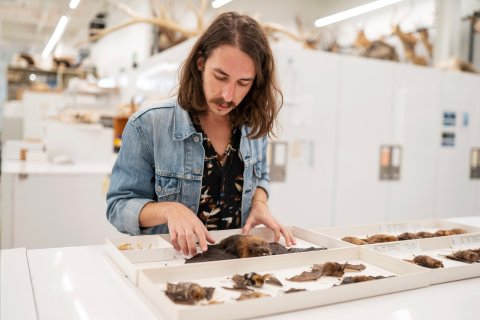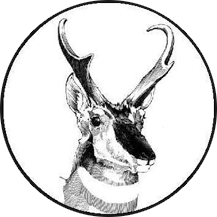About the Committee
Chair
- Rebecca J. Rowe (rebecca.rowe@unh.edu)
Members
|
|
History and Mission
The James L. Patton award was established in 2015 to promote and support museum-based research by graduate student members of ASM. Each year, one $6000 award will be granted to facilitate the direct use of museum specimens to advance the study of mammalian diversity. Funds can be used to cover travel costs to visit natural history collections, associated analytical or equipment costs, and fieldwork that enhances collections; see budget details for additional information. The award honors Jim’s commitment to natural history collections and their use in understanding the diversity and evolution of mammals, his passion for mentoring young mammalogists, and his long-standing service to the society.
The James L. Patton Award is a competitive fellowship. Both MS and PhD level students are encouraged to apply. We particularly encourage proposals that include the direct inspection of museum collections, including both traditional and/or novel uses of specimens and their associated data. The project description should include mention of broader project objectives and the specific component for which collections use is being requested. Applicants should also describe how their research contributes to the development of natural history collections and their associated data (e.g., field collection, curation, and digitization). The award supports research on a broad range of topics, but preference will be given to proposals that use and develop collections of Recent mammals.
2024 James L. Patton Award Recipient

Maya Juman is a PhD student at the University of Cambridge, supervised by Dr. Olivier Restif at the Department of Veterinary Medicine. She studies the disease ecology of fruit bats (family Pteropodidae), with a focus on paramyxoviruses (which include the zoonotic Hendra and Nipah viruses). Maya completed a B.S. in Ecology and Evolutionary Biology at Yale University, where she worked as a collections assistant and tour guide at the Peabody Museum of Natural History. As an undergraduate, she used museum specimens to study taxonomic boundaries and ecogeographic rules in treeshrews (advised by Drs. Eric Sargis, Neal Woodman, and Link Olson). After graduating in 2020 and working in urban public health and COVID-19 response for two years, she entered graduate school seeking to combine her background in mammalogy with a newfound interest in zoonotic viruses. She is particularly interested in museum collections as untapped resources for proactive pathogen discovery and reservoir identification. Her current research employs machine learning algorithms to predict pteropodid hosts of paramyxoviruses. With the support of the Patton Award, Maya will empirically test these predictions by screening museum bat specimens for viral RNA. Results from this project will inform disease surveillance efforts and potentially expand our library of known vertebrate-virus associations. This work highlights the continued—and evolving—relevance and value of natural history collections in the Anthropocene.
Donate Now!
You can donate to the James L. Patton Award fund (and others) here.
Reports
Eligibility & Instructions
James L. Patton Award
The application period opens 15 January with a submission deadline of 1 March at 11:59 PM (EST). Reference letters are due 10 March.
Eligibility:
- Students enrolled in a MS or PhD program are eligible to apply. It is expected that the award will support the student as they work towards their degree such that the student will remain enrolled for at least one semester after receiving the award.
- We encourage applicants of all nationalities; no restrictions are placed based on citizenship or the country in which the applicant is studying.
- Applicants must be ASM members at the time of submission. We encourage all applicants to become long-term, engaged members of the society.
Application Requirements:
- Research Proposal (two page maximum not including Literature Cited; 12 pt font, 0.5" margins, single spaced.)
- Within the 2-page limit, each proposal is to contain a Museum Collections Statement. Here, applicants are to summarize their engagement in collections-based research and describe how their research will contribute to the development of natural history collections and their associated data (e.g., field collection, curation, and digitization).
- Itemized Budget (two page maximum, including table and justification)
- Categorize each item (e.g., Equipment, Travel, Accommodations)
- Detail the Collections that will be used and the estimated number of specimens that will be used/examined at each collection
- Provide estimated total cost and amount requested from the Patton Award.
- Indicate sources of funds (e.g., Patton Award, Sigma Xi, etc.) received and pending.
- Funds can be requested for fieldwork if that work aligns with the collections-based research and the fieldwork results in products that will enhance collections
- Funds cannot be used to cover salary or stipend
- Current CV (three page maximum)
- One Letter of Support - This letter must be from your Faculty Advisor or other research mentor who can speak to the proposed work and the need for the funding. You will be asked to provide an email address for this individual during your application submission.
- Previous ASM support - If you have received previous support from ASM, provide the source of funding (e.g., GIA, African Graduate Research Fund), year, proposal title, and a brief summary of progress (one page maximum). Please note, ASM has a two-award limit per student.
- For the file attachments, please use this naming convention: "LAST NAME _ DOCUMENT TYPE" (ex. Smith_Proposal.doc, Smith_Budget.doc, Smith_PreviousSupport.doc).
Apply
See the grants page to submit the application. Applications are due March 1.
Recipients
Recent Recipients
2023 Recipient
|
Image
 |
Edú Guerra is a PhD student in the Biology department at the University of Washington, working under the guidance of Dr. Sharlene Santana. He is a Brazilian mammalogist with a keen interest in exploring the ecological and evolutionary dynamics within a spatial and temporal context. During his undergraduate studies at Universidade Federal do Espírito Santo, he learned from Dr. Yuri Leite and Dr. Leonora Costa the first steps of mammal surveying –from placing traps to storing specimens in drawers– and the importance of museum collections to understand biodiversity. With a Master's degree in Ecology from Universidade Federal do Rio de Janeiro and previous experience as a Curatorial Assistant, Edú is currently an active member of the Collections Committee of the Brazilian Society of Mammalogists. In his current research, he focuses on using Tamiasciurus douglasii as a model system to investigate the impacts of ongoing climate change on intrapopulation phenotypic variability. This involves visiting museum collections to collect morphological and genomic data from both modern and historical populations. By comparing these data across the geographic distribution of Tamiasciurus douglasii, he aims to elucidate temporal changes and spatial patterns. Additionally, Edú is passionate about teaching and engaging in outreach activities that highlight the value of museum collections. |
2010–2019
- 2016—Christopher Law, University of California, Santa Cruz. Adaptive radiation and the effects of sexual dimorphism on morphological diversification of Musteloidea.
- 2017—Jonathan Nations, Louisiana State University. Using museum specimens to understand how extraordinary diversity is maintained in the rodent communities of Sulawesi, Indonesia.
- 2018—Leonardo Cotts, Federal University of Rio de Janeiro. Osteological variability and variation in the skull and appendicular skeleton of Tamadua (Xenartha, Pilosa): investigations on ontogeny, sexual dimorphism and osteopathologies for the genus.
- 2019—Edgardo M. Rengifo Vásquez, University of São Paulo. The role of the "Cordillera Blanca" (Ancash, Peru) in the evolutionary history of sigmodontine rodents in northern Peru.
2020+
- 2020—Giovanni Tolentino Ramos, University of Oklahoma. Back to the Past: delimiting the effects of climate change through historical specimens.
- 2021—Courtney Reed, Brown University. Interactive effects of predation and habitat on evolution of gerbil hindlimbs
- 2022—Gabriele Ilarde, University of Minnesota.
- 2023—Edú Guerra, University of Washington
- 2024—Maya Juman, University of Cambridge
